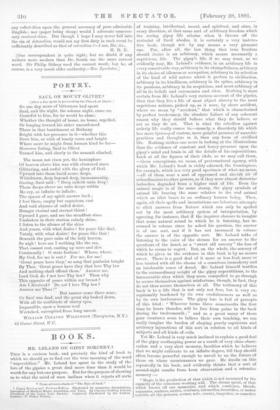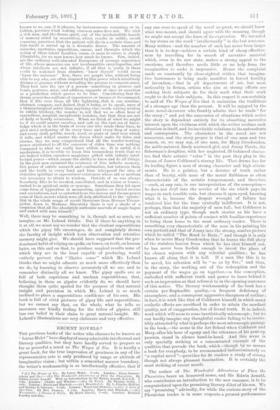BOOKS.
MR. LELAND ON GIPSY SORCERY.t THIS is a curious book; and precisely the kind of book to which we should go to find out the true meaning of the word "superstition." Mr. Leland has spent in the study of the lore of the gipsies a great deal more time than it would be worth for any but one purpose. But for the purpose of showing us to what the mind of man inclines when it rejects all sorts • From advance-sheets of "The Epic of Saul."
Gypsy Sorcery/ awl Fortune-Ts/ling. Illustrated by numerous -Incantations, Specimens of Medical Magic, Anecdotes, and Tales. By Charles Godfrey Leland, President of the Gypsy Lore Society. Copiously Illustrated by the Author.
London T FiNhor Unwin.
of training, intellectual, moral, and spiritual, and aims, in every direction, at that same sort of arbitrary freedom which the roving gipsy life attains when it throws off the
restraint of fixed abodes, it is certainly a very instruc- tive book, though not by any means a very pleasant one. For, after all, the last thing that true freedom should desire is an arbitrary, which means necessarily a capricious, life. The gipsy'a life, if we may trust., as we evidently may, Mr. Leland's evidence, is an arbitrary life in every conceivable way, arbitrary in its changefulness, arbitrary in its choice of idleness or occupation, arbitrary in its selection of the kind of wild nature which it prefers to civilisation, arbitrary in its kindliness, arbitrary in its spites, arbitrary in its passions, arbitrary in its scepticism, and most arbitrary of all in its beliefs and ceremonies and rites. Nothing is more certain from Mr. Leland's very curious account of the gipsies, than that they live a life of most abject slavery to the most capricious notions, picked up, as it were, by sheer accident, where we mean by "accident," that which is characterised by perfect irrelevancy, the absolute failure of any coherent reason why they should believe what they do believe or act as they do act. That is what the rebellion against
orderly life really comes to,—namely, a disorderly life which has more tyranny of custom, more painful pressure of anarchic practices and. thoughts in it, than any form of civilised life. Nothing strikes one more in looking at the illustrations than the evidence of constant and heavy pressure upon the gipsy's mind and brain in all the details of his superstitions. Look at all the figures of their idols, as we may call them, —those conceptions, we mean, of preternatural agency, with which Mr. Leland's book is richly adorned, the frontispiece, for example, which is a very good specimen of what..we mean, —all of them wear a sort of oppressed and slavish air of subordination to other powers, as if they were almost demoniac imbeciles, degraded from a higher rank of life. Even the animal magic is of the same stamp, the gipsy symbols of
animal life bearing the same relation to the real animal which an idiot bears to an ordinary human being. Then, again, all their spells and incantations are laborious attempts to elicit answers from Nature which can only be spelled out by the most arbitrary system of interpretation, by agreeing, for instance, that if the inquirer chooses to imagine that some natural sound to which he is listening, has in- creased in volume since he asked his question, the answer is of one sort, and if it has not increased in volume the answer is of the opposite sort. Mr. Leland talks of listening to the voice of the stream for an answer to the questions of the heart, as a "sweet old sorcery" the loss of which he seems to regret.. But, on the whole, the sorcery of
which he gives us the evidence in this book is by no means sweet. There is a good. deal of it more or lees foul, more or less tainted. with all the shame of a conscious immodesty and an intolerable sense of dread. Mr. Leland himself testifies to the extraordinary weight of the gipsy superstitions, to the innumerable rites which they seem compelled to go through to secure themselves against misfortune, though, in fact, they do not thus secure themselves at all. The testimony of this book is to a life that is not only not free, but is very ex- ceptionally burdened by its own credulousness as well as by its own lawlessness. The gipsy lore is full of precepts of this kind : " Whoever turns three somersaults the first time he hears thunder, will be free from pains in the back during the twelvemonth ; " and as a great many of these poor creatures seem to believe their own teaching, we can easily imagine the burden of obeying purely capricious and.
arbitrary injunctions of this sort in relation to all kinds of subjects and all kinds of evils.
Yet Mr. Leland is very much inclined to explain a good deal of the gipsy soothsaying power as a result of very close obser- vation and a very alert memory, faculties which he believes that we might cultivate to an infinite degree, till they should often become powerful enough to unveil to us the future of those on whose countenances we gaze. He dwells on this repeatedly in his book, and evidently thinks that a sort of second-sight results from keen observation and a retentive memory :— "Magic is the production of that which is not measured by the capacity of the conscious working will. The dream spirit, or that which knows all our memories, and which combines, blends, separates, scatters, unites, confuses, intensifies, beautifies, or makes terrible all the persons, scenes, acts, events, tragedies; or comedies
known to us, can, if it pleases, by instantaneous reasoning or in- tuition, perceive what waking common sense does not. We visit a sick man, and the dream spirit, out of the inexhaustible hoards of memory aided by association, which results in subtle, occult reasoning, perceives that the patient will die in a certain time, and this result is served up in a dramatic dream. The amount of miracles, mysteries, apparitions, omens, and theurgia which the action of these latent faculties cause, or seem to cause, is simply illimitable, for no man knows how much he knows. Few, indeed, are the ordinary well-educated Europeans of average experience of life, whose memories are not inexhaustible encyclopedias, and whose intellects are not infinite; if all that is really in them could be wakened from slumber, know thyself' would mean 'know the universe.' Now, there are people who, without being able to say why, are often inspired by this power which intuitively divines or guesses without revealing the process to common sense. They look into the eye of a person—something in glances and tones, gestures, mien, and address, suggests at once an assertion or a prediction which proves to bo true. Considering that the clream.power has millions of experiences or images at its command, that it flits over them all like lightning, that it can combine, abstract, compare, and deduct, that it being, so to speak, more of
thaumaturgical artist than anything else, excels waking wisdom in subtle trickery, the wonder is, not that we so often hear of marvellous, magical, inexplicable wonders, but that they are not of daily or hourly occurrence. When we think of what we might be if we could master ourselves, and call on the vast sea of know- ledge which is in the brain of every one who reads these lines, to give strict reckoning of its every wave and every drop of water, and every shell, pebble, wreck, weed, or grain of sand over which it rolls, and withal master the forces which make its tides and storms, then we may comprehend that all the wonder-working power attributed to all the sorcerers of olden time was nothing compared to what we really have within us. It is awful, it is mysterious, it is terrible to learn this tremendous truth that we are indeed within ourselves magicians gifted with infinite intel- lectual power—which means the ability to know and do all things. In the past men surmised the existence of this infinite memory, this power of subtle research and combination, but between them and the truth in every land and time interposed the idea of objective spiritual or supernatural existences whose aid or medium was necessary to attain to wisdom. Outside of us was always Somebody Else to be invoked, conciliated, met in vision or trance, united to in spiritual unity or syncope. Sometimes they bit upon some forum of hypnotism or mesmerism, opiates or forced swoons and convulsions, and so extorted from the nerves and dream-power some of their secrets which were all duly attributed to the spirits.' But in the whole range of occult literature from Hermes Trisme- gistus down to Madame Blavatsky there is not a shade of a suspicion that all the absolutely authentic marvels of magic began and ended with man himself."
Well, there may be something in it, though not so much, we imagine, as Mr. Leland thinks. But if there be anything in it at all, we must say we wonder that the virulent superstitions which the gipsy life encourages, do not completely drown the faculty of insight which keen observation and retentive memory might give. We should have supposed that the pre- dominant habit of relying on spells, on bones, on teeth, on human hairs, on this and on that, to produce magical results none of which they are in the least capable of producing, would entirely pervert that "illative sense" which Mr. Leland thinks that we might educate so much more effectively than we do, by learning to observe accurately all we see, and to remember distinctly all we know. The gipsy spells are so full of both capricious and unclean superstitions, that, believing in them as gipsies evidently do, we should have thought them quite spoiled for the purpose of that natural insight and prevision in which Mr. Leland is so much inclined to place a superstitious confidence of his own. His book is full of vivid pictures of gipsy life and superstitions, but we cannot say that, on. the whole, what he tells us increases our kindly feeling for the tribes of gipsies, still less our belief in their claim to great natural insight. Mr. Leland's illustrations are very elaborate and very effective.







































 Previous page
Previous page